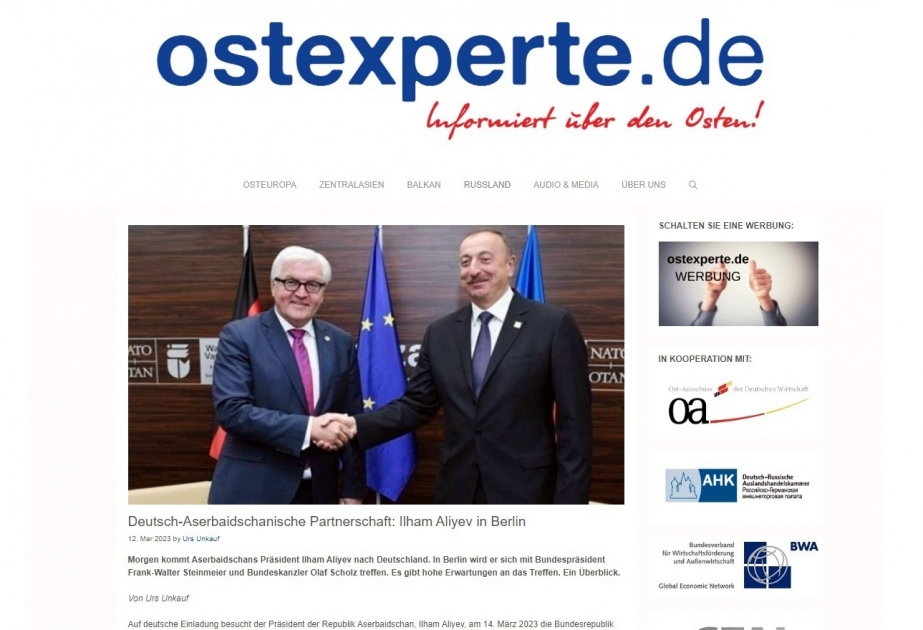
The German Ostexperte.de portal has published an article titled “German-Azerbaijani Partnership: Ilham Aliyev in Berlin”.
Written by Urs Unkauf, the article says: “At Germany’s invitation, the President of the Republic of Azerbaijan, Ilham Aliyev, will visit the Federal Republic of Germany on March 13, 2023. He will meet with President Frank-Walter Steinmeier and Chancellor Olaf Scholz in the German capital. A month earlier, President Aliyev attended the 59th Munich Security Conference (MSC), where he discussed the prospects of a peace settlement for the stability of the South Caucasus in a panel discussion with Armenian Prime Minister Nikol Pashinyan, among others. The working visit and participation in the MSC was also preceded by the working visit of a high-level Azerbaijani business delegation on February 10, which was received by the German side at the Federal Ministry of Economy and Climate Protection.
The current talks will focus on issues of bilateral relations, economic and energy policy content, as well as regional and international security issues. Azerbaijan sees Germany as a central strategic partner within the European Union, both for economic cooperation and for political cooperation.
From the German side, in turn, the energy policy aspect gained a new momentum as a result of the attack on Ukraine launched by the Russian Federation on February 24, 2022, and the resulting war. As a consequence of the termination of the import of fossil fuels from Russia, a vacuum appeared on the European natural gas market, which had to be filled by new and reliable supply partners. Azerbaijan has already been one of the most important oil suppliers to the Federal Republic for years. Under Azerbaijan’s new supply agreements with the European Union, Baku now delivers Azerbaijani natural gas from the Shah Deniz field in the Caspian Sea through Georgia and Türkiye to Greece, Albania and Italy via the Southern Gas Corridor, thus making an essential contribution to securing Europe’s energy supply. There is widespread consensus in German industry that natural gas, as a bridging technology, is an indispensable transmission belt for the successful implementation of the ambitious energy transition goals while maintaining the country’s economic performance. Meanwhile, the Azerbaijani economy is relying on a comprehensive strategy of diversification and a targeted orientation toward sustainability and social compatibility of the associated reform measures. Thanks to its geostrategic location, a young and, in international comparison, highly educated population, and prudent government policies, the economy, which until now has been largely focused on the extraction and refinement of oil and natural gas, has numerous opportunities to build new capacities in various areas. For example, agriculture and tourism: Azerbaijan actively participated in the leading international trade fairs, the International Green Week (IGW) and the International Tourism Exchange (ITB) in Berlin in January and March 2023, respectively. Likewise, thanks to favorable energy prices and non-wage labor costs, as well as the availability of well-trained specialists and excellent logistical connections by land, sea and air, there are excellent opportunities for the establishment of industrial production and processing plants for high-value export goods to the Caspian region and the South Caucasus.
A key priority for Azerbaijan – also with regard to economic and security relations with Germany – is the reconstruction of the Azerbaijani territories in Karabakh and East Zangezur, which were liberated from Armenia’s illegal occupation in 2020. In addition to three international airports, special economic zones are being set up, among other things, to motivate international business involvement in the liberated territories. The strategy of the “Green Zone” envisages that this region will be fully supplied with renewable energy and will also export it to other parts of the country as well as transnationally. The geographical conditions for solar and wind energy, as well as for the development of hydrogen production, are excellent. The potential of renewable energy in Azerbaijan is about 200 GWh, which offers interesting opportunities for German companies.
Regarding the security situation, Azerbaijan is striving for a peace solution with Armenia. The negotiations for this are being actively accompanied by various international players – Russia, the USA and the EU. So far, however, the Armenian leadership has been slow to back up Prime Minister Pashinyan’s words with action, and Armenia’s repeated provocations toward Azerbaijan on the internationally recognized border are slowing down the process. Azerbaijan guarantees equal civil and minority rights for Armenian residents in Karabakh under its state constitution. Initial talks between Baku and representatives of the Karabakh Armenians have already taken place in this regard. For Azerbaijan, in turn, the use of the Zangezur corridor to connect the Nakhchivan Autonomous Republic with the rest of Azerbaijan via the Armenian region of Mehri, as stated in the trilateral declaration between Azerbaijan, Armenia, and the Russian Federation of November 10, 2020, is central to regional development. A sustainable solution for stability in the South Caucasus as well as the promotion of friendship and reconciliation efforts between Azerbaijan and Armenia is also in the German or European strategic interest. In this regard, the German side would be well advised to recognize that the intention of Azerbaijan, which is currently proven to be more committed to advancing the process than neighboring Armenia, is to find a long-term solution to this conflict within the internationally recognized borders of both states, and that Baku’s interests should be taken seriously in this regard.
In this context, this visit by President Ilham Aliyev can be more than just a symbolic gesture, but can contribute to opening a new chapter in German-Azerbaijani as well as European-South Caucasian relations.”
